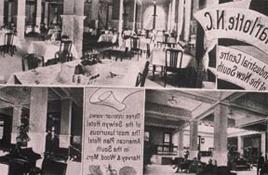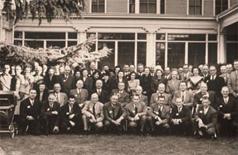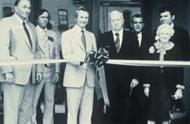Early Years
Founded in 1908 at a meeting in Charlotte.
First known as the Carolina Municipal Association.

Twenty-two cities considered "founding" members: Asheville, Charlotte, Edenton, Fayetteville, Greenville, Greensboro, Henderson, High Point, Kinston, Laurinburg, Lincolnton, Morganton, Newbern (as it was known in 1908), Oxford, Raleigh, Reidsville, Rockingham, Salisbury, Statesville, Tarboro, Wilmington, and Winston (became Winston-Salem five years later).
Renamed North Carolina Municipal Association in 1922 when new constitution adopted
Purposes of organization always been to promote excellence in municipal government, provide opportunities for officials to exchange ideas, to advocate for cities and towns, and to develop a "cooperative approach to all municipal problems of statewide import."
In very early years, primarily a lobbying organization.
Among the municipal association's (as League was then known) early legislative successes were the following.
The Municipal Corporation Act of 1917 and the Municipal Finance Act of 1917, which gave cities and towns more local control and the authority to issue bonds.
Bills enacted to allow municipalities to "adopt zoning regulations, to provide group insurance for municipal employees, to charge sewer construction costs and drainage system construction costs to abutting property owners, to create recreation programs and to appoint cemetery trustees to operate municipal cemeteries."
A bill lifting the prohibition on city taxes on electric light, power, gas, street railway or other public service corporations. (1925).
League's history of regular publications to membership began in Jan. 1928 with publication of the North Carolina Municipal Review. Have had some stops, starts and major revisions, but still publishing, now known as Southern City.
Middle Years
Adopted new constitution in 1934 and became N.C. League of Municipalities.
In 1935, League obtained for cities and towns $500,000, the first direct state aid from state gasoline tax revenues for streets inside municipalities.
 Equitable share of state gas taxes was long-sought goal of League. First discussed in 1930s when League asked for 10 percent.
Equitable share of state gas taxes was long-sought goal of League. First discussed in 1930s when League asked for 10 percent.
Legislative bill reporting service to membership began in 1935.
First Mayors' Day in 1935 - this legislative briefing and rally still held, but now called Town Hall Day.
Legislative accomplishments of the 1930s included authority to establish capital reserve funds, and ability to establish retirement systems for employees.
League began talking about home rule for cities and towns with discussion of a constitutional amendment in 1937.
In 1937, state took one-half of the intangibles tax revenues away from cities and towns, had wanted to take all of it. In subsequent years, League fought to get this revenue restored.
League in the 1930s began providing purchasing service, services to groups affiliated with League, field services, studies for municipal utility systems, codification of ordinances, inquiry services, information and research, and charters. The first directory of municipal officials was published in 1936.
League carried out several very large WPA projects during the depression years, including codifying existing ordinances for many municipalities, setting up uniform police records systems, and a major study of government practices.
An investigation by the League on fire insurance rates on municipal property resulted in a 25 percent decrease in rates by insurance companies.
After World War II, League expanded its inquiry services and field operations, offering expertise to municipalities wanting to establish zoning and land use plans, for example.
League began sponsorship of a group insurance plan for cities and towns in 1950.
In late forties, the organization continued efforts to increase state support for municipal streets and, in 1951, won perhaps its most famous legislative battle - enactment of the Powell Bill. When first enacted, provided proceeds from one-half cent of state gas tax. Now more than $180 million in Powell Bill funds annually go to cities and towns.
Since 1951, League secured several raises in Powell Bill funding.
1959 passage of annexation bill.
In subsequent years, annexation authority has been studied, amended, studied, amended and come under fire almost every legislative session. The League has preserved this essential authority for cities and towns.
Recent Years
League helped secured local option sales tax authority for local governments - the original one-cent and the later, additional taxes.
The North Carolina League helped lead national efforts to reauthorize General Revenue Sharing in the 1970s.
The League won more home rule provisions for cities and towns in electing and structuring their governing boards.
Then Scotland Neck Mayor Ferd Harrison was elected second vice president of the National League of Cities in 1980, the first officer ever from a town under 25,000 in population.
League worked closely with legislative commissions and legislators on revision of the state laws government municipal finances and the Budget and Fiscal Control Act.
League spearheaded efforts to get numerous clean water bond issues passed, most recently in 1998.
League was a leader in 1989 successful effort to greatly increase transportation funding.
In cooperation with N.C. Association of County Commissioners, built the Albert Coates Local Government Center in 1979, debt-free.
Established self-funded pool for workers' compensation (NCIRMA) in 1981. 
Established self-funded pool for health and employee benefits (MIT of NC) in 1983.
Established self-funded pool for property and liability coverages (IRFFNC) in 1986.
All three funds in excellent financial health, operated by and for cities and towns and their related public entities.
Built the S. Leigh Wilson Building in 1986, debt-free. Originally designed for the League's insurance operations, most of the space in this small building is now rented out.
Built the David E. Reynolds Building to house the League's insurance operations, general finance operations and other League functions. Also debt-free.
